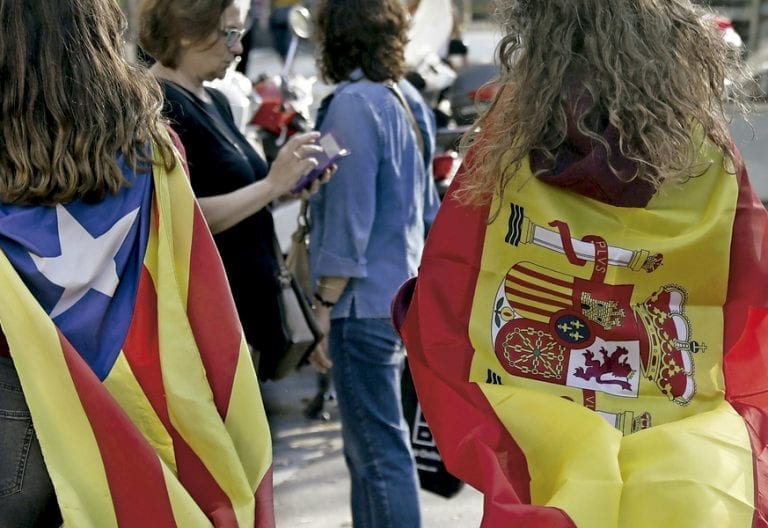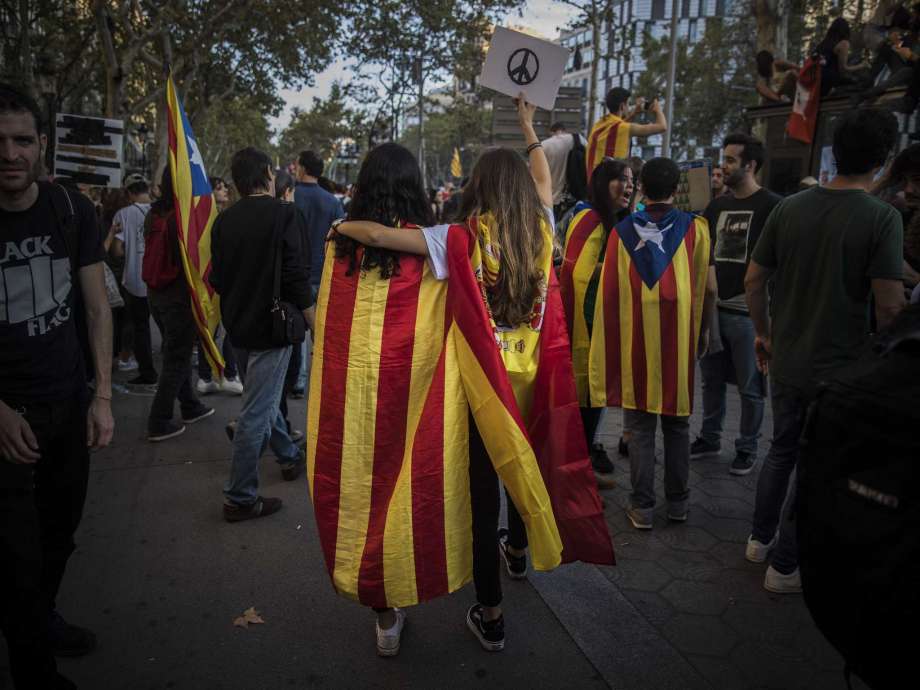By K.P. our resident food critic Paella is one of Spain’s national joys (as you probably know) and is hands down the one dish you HAVE to wrap your mouth…
Contact Us
We’re here to help, so hit us on any of the channels below or scroll on down for the contact form.
BARCELONA BOATS Email
san sebastian surf Email
Phone
Everything Else
BARCELONA BOATS WhatsApp
SAN SEBASTIAN SURF HOUSE WhatsApp
Social
Catalan Independence: What We Know And What We Don’t Know
Stokepedia

We know that a lot of people turn to Stoke Travel for guidance in times of political uncertainty. The current crisis playing out in Catalunya is one that is particularly close to home, because Barcelona is literally our home. As such, despite being unable to vote and have our opinions count officially, we do find ourselves following the independence situation, out of personal curiosity and to keep our friends abroad informed. This is by no means all you need to know about Catalan independence, but it’s our take on it. More like a beginner’s course into a very complex situation.
Has Catalunya ever been an independent nation?
Not really. From prehistory to Roman times and the Muslim occupation, the region we now know as Catalunya had an experience in line with the rest of what we now know as Spain, with Catalunya having a little more French influence due to its location as a buffer from Muslim invasion. Around the 1100s Catalunya became a County of the Kingdom of Aragon and Catalan influence expanded into Valencia and the Balearic Islands. In 1469, when Spain was unified by the marriage of Ferdinand of Aragon and Isabel of Castile, Catalunya was along for the ride, and was left more or less to its own devices. Following the Spanish War of Succession (1702-1714), when two European monarchs fought over the right to rule Spain, Catalunya ceased to be a County of Aragon and was made a province of the Crown of Castile by Philip V of the House of Bourbon, due to the Catalans’ support for the Habsburg Archduke Charles, now known as the losing side in the war. From then until the Second Spanish Republic (1931-1939) there were various Catalan calls for independence, none successful, followed by brief peace and satisfaction under the republic before Catalans fought alongside Republican forces from the rest of Spain against the forces of General Franco during the Spanish Civil War. After their defeat, the Catalans suffered repression under Franco’s dictatorship and following his death voted enthusiastically to adopt the terms of the 1978 Spanish constitution.
Now that’s a very abridged version of Spanish and Catalan history, but the basic idea is that for the entirety of its existence Catalan history has been attached to that of Spain. There is little to no historical justification for an independent Catalunya based on it once being an independent nation. Doesn’t mean it’s impossible, just that it’s without precedent.
Has Catalunya ever been autonomous?
Oh yeah, that’s kind of like the default setting here. From being a County of Aragon, up until the Spanish War of Succession, Catalan language and laws were given the freedom to flourish and spread, which is why in the Balearic Islands and Valencia they still speak Catalan dialects today. Catalan institutions were abolished following their support for the losing side in the Spanish War of Succession, including the parliament, and the Catalan language was outlawed in official business, and in schools. Under the Second Spanish Republic Catalan institutions were reinstated and autonomy was regained until the rule of Franco. Franco sought to punish the Catalans for their resistance during the Spanish Civil War, and there was widespread repression of all things Catalan, but this was overturned following his death and the 1978 constitution. Since then Catalunya has been autonomous to the degree of having control over its own police force and public broadcaster, and departments of education, healthcare, culture, and justice, among others. The Catalan language is taught in schools and is used almost exclusively in communications between the regional government and the people.
In 2005 a new draft was created to the statute of Catalan autonomy. In it greater fiscal control was afforded the region, as well as recognition of Catalunya as a nation. In 2010 the, then in opposition, Partido Popular made a challenge to the amendments and had much of it ruled unconstitutional, or changed the interpretation. It was this act by PP, who are the current government of Spain, that set off this latest round of Catalan independence.
Have Catalans always wanted independence?
Support for this current independence movement has risen in the last decade or so from a low of around 15% to where we are today, with anywhere from 40% to more than 50% of the Catalan population desiring independence. This rise has been ascribed to the effects of the Global Financial Crisis on Spain, and the feeling that Catalans were bailing out less prosperous regions of Spain, and the aforementioned reversal of the amended Autonomy statute. Real numbers are difficult to ascertain, the most recent comprehensive poll by the Catalan government put independence at 41% against 49% desiring to remain, and the 2015 Catalan elections that were seen as a litmus test for the movement failed to gift separatist parties a clear majority. The October 1st referendum saw 90% of voters opt for secession from Spain, but with 42% voter turnout. What is clear is that supporters of independence rise during times of economic and political turmoil in Catalunya.

Who’s to blame for the current situation?
While it’s obviously the fault of both sides, we’re going to go right out on a limb here and blame the conservative Partido Popular government, and the Spanish president Mariano Rajoy, for this rise in Catalan separatism. Their almost autocratic application of Spain-centric policy have driven the Catalans away from the rest of the country, from their successful 2010 overturning of the autonomy revisions, to barefaced refusal to engage and have dialogue with the separatists, it has been PP policy that has fostered this rise in Catalan separatism. And while their repeated claims that they have been given no other options when faced with a Catalan government that openly breaks constitutional laws and only seeks dialogue that will end in independence, as the more powerful party in the relationship they’ve had ample opportunity to put aside their rigidity for a moment and allow the Catalans come concessions, and in doing so deescalate the crisis.
Where are we at now?
The Catalan minority government insisted pressed on with their vow to create an independent republic and have repeatedly called for a referendum, which the government has equally repeatedly said is against the constitution and therefore illegal. Ignoring claims of the vote’s illegality, the referendum went ahead on October 1st, and despite police violence that was seen around the world, and amid claims of voter fraud, 43% of eligible Catalans cast their ballot for independence, of which 90% voted for yes. The referendum organisers saw this as a clear mandate for the formation of a Catalan republic, despite only around 2,000,000 of Catalunya’s 5,300,000 voters opting for independence. The reason for the low turnout was that, given the vote’s illegality in the eyes of the Spanish state, the vast majority of remain voters boycotted the referendum, while separatists claim that the police action prevented people from voting.
Citing the results, the Catalan President, Carles Puigdemont, declared independence on the 10th of October, and then immediately suspended it to allow for dialogue. The Spanish government gave him until the 16th of October to simply state whether independence had been declared or not, which Puigdemont failed to respond to. Following that the Spanish government stated its intention to trigger Article 155 of the constitution, which would give Madrid control over Catalunya’s autonomy due to its “undermining of national interests.” With 155 looming, the Catalan parliament hastily voted in a declaration of independence, doing so mere hours before the Spanish government were due to vote for the application of 155.
There were jubilant scenes in Barcelona for a few hours before it was announced that the Spanish government had sacked the Catalan parliament and many public servants, taken control of the regional police force, and called for Catalan elections on December 21st that should serve as a de facto referendum on independence, but this time with participation from those who wish to remain in Spain. If, however, a majority of Catalans vote for pro-independence parties the Spanish government will be forced to address the issue, meaning a probable change to the constitution followed by a binding referendum. The call for elections so quickly indicates that the Mariano Rajoy government in Madrid doesn’t want their suspension of Catalan autonomy to appear like a return to Francoist oppression in the region, and desire a swift solution to what has already been a prolonged political crisis. Up to 20 pro-independence politicians have also been charged with rebellion, a charge that is punishable for up to 30 years in jail, and at the time of writing now-former-president Puigdemont is apparently in Belgium seeking asylum from the Flemish separatists who are coalition partners there.
What happens next?
Catalans go back to the polls, and given the wavering nature of separatist sentiment in Catalunya, what both sides of the debate do over the coming weeks will have a profound impact on the outcome of the election. The imagery of police beating voters was a massive PR coup for the separatists, and likely turned many undecided Catalans into independentists. The Spanish government would be wise to exercise restraint and gently control Catalunya during this period of suspended autonomy, to not use all the powers available to them. Similarly, the unilateral declaration of Catalan independence was seen as an unnecessary provocation by many moderate separatists. If independence parties lose the election, the fervour that has propelled the movement so far will somewhat subside. If the people show that support for independence has gone up, however, then that outcome will have to be seriously considered by all sides of politics, and political actors in Spain and abroad.
Do we even know how an independent Catalunya would be received by the world?
One of the strangest things about this recent push for Catalan independence is that it came without any clear indication of what post-Spain Catalunya would look like, from finances to defence, to recognition by other countries, relationship with Spain and membership in the European Union. Separatists were so happy to discard their ties with Spain, even while European diplomats and governments around the world said that they would not recognise a Catalan republic. If a majority of Catalans do desire an independent republic they need assurances as to how such a republic would operate in the world, and, ideally, retain EU membership. This is a massive change to Catalunya, Spain and Europe and the repercussions will be felt for a while afterwards, not least of which in regions that have similar separatist aspirations, like the Basque Country in Spain, and across Europe, from the Scots, to the Bavarians and down to Corsica.
Is being a part of Spain ain’t so bad?
It really isn’t. Under the current terms Catalunya enjoys more autonomy than almost any other European region and is consequently one of the most prosperous. Far from the dark days of fascism, Catalans are free and able to exercise their culture and language as they please. Talk of a fiscal deficit coming out of Catalunya to pay for poorer regions has been overblown by separatists, but nevertheless that is how nations work — richer regions prop up their poorer partners. Many Catalans complain about being left out of Spain, of being disliked in other parts of the country, and this has become increasingly true during this constitutional crisis. Moving forward, the Madrid government will have to work hard at changing the perception of catalans in Spain, for citizens both within and outside the region if they are to put a limit on separatist sentiment in the future.
Can Catalunya be an independent state WITHIN the European Union?
If the Catalans really do want out, there is a fairly good case for smaller nation states, to prosper if they have defence and trade matters taken care of by, say, someone like the EU. Smaller states can better take care of their citizens needs than big, distant central governments and the people rightfully feel more engaged with decision making. Currently, the European Union isn’t quite ready for this kind of political arrangement, but with talk of a European Defence Force perhaps this isn’t too far off.

But for now we’re dealing with massive division in Catalunya and Spain.
People’s families are being literally ripped in half, there are protests and counter protests every other day, half the populace is angry at the Policia Nacional for their heavy-handed actions during the October 1st elections and the other half feels like the Catalan Mossos force let them down by not acting on that very same day. Following the uncertainty in Catalunya, more than 1800 companies have changed their registered business addresses (not Stoke Travel) and the tourism sector is reporting a 15% drop in bookings on this time last year.
And above all, we hope that everyone can just get along.
We love Barcelona! And while the city is humming along like always on the surface, it’s difficult to not think about the ideological rifts tearing the city apart. It’s a real shame to see politicians on both sides act irresponsibly and allow, or even encourage, events to get like this. At a time when dialogue is the only solution we see people entrenching themselves in their positions, unwilling to listen to alternative opinions and bolstering their prejudices with selective readings of history. The Catalan crisis will only be mended by listening to more voices, not less, and that’s why we were happy to throw our interpretation into the fray. We don’t have an entrenched view either way, although we definitely dislike borders and don’t see the point in making more unless you really have to. Every day the situation here is evolving, and the 1st of October notwithstanding, it has been relatively violence free. Barcelona and Catalunya are still very safe places to visit, and if you have any plans coming here in the future we strongly recommend that you stick with them. The city is still beautiful, the food delicious, and you might just see some history unfold.
Visca Catalunya! Viva España! And long live Stoke Travel.
